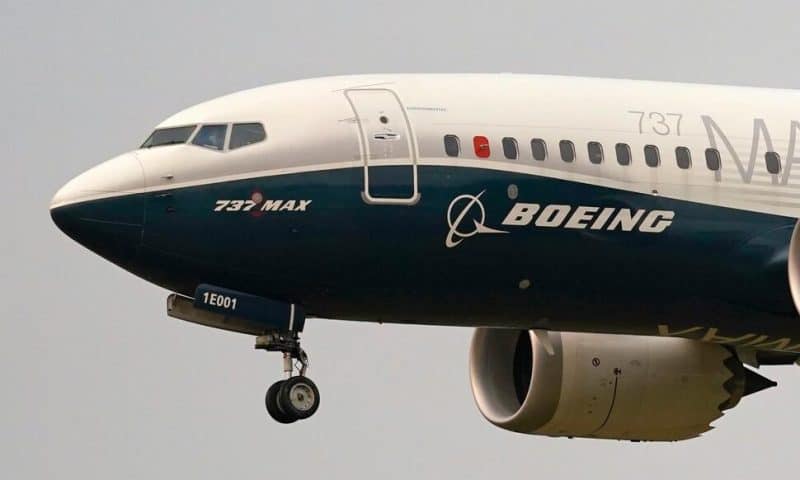Boeing discovered another problem in some of its 737 Max fuselages that may delay deliveries of about 50 aircraft in the latest quality gaffe to plague the manufacturer
Boeing discovered another problem in some of its 737 Max fuselages that may delay deliveries of about 50 planes in the latest quality gaffe to plague the giant aircraft manufacturer.
Boing said late Sunday that an employee of a supplier alerted managers about improperly drilled holes. The head of Boeing’s commercial airplanes division said some planes that have not yet been delivered to airlines will need to be reworked, but he said the issue did not affect the safety of Max jetliners that are already flying.
The revelation of new quality issues involving Boeing planes came as another leading airline executive took aim at the manufacturer.
The president of Emirates, a major international airline based in Dubai, told the Financial Times he has seen “progressive decline” in Boeing standards, which he blames on management mistakes – including putting financial performance over engineering excellence.
“They have got to instill this safety culture which is second to none,” Tim Clark told the newspaper. “They’ve got to get their manufacturing processes under review so there are no corners cut, etc. I’m sure (Boeing CEO) Dave Calhoun and Stan Deal (chief of Boeing’s commercial-airplanes division) are on that … this is the last chance saloon.”
Clark is the latest industry executive to criticize Boeing, adding to pressure on Calhoun, who became CEO after Dennis Muilenburg was fired during the fallout from two deadly crashes involving Max 8 planes. In all, 346 people were killed.
The latest quality issue involves two holes that were incorrectly drilled in the window frames of some Max jets. The problem was reported by Spirit AeroSystems, a major supplier that provides Boeing with fuselages for the Max.
“While this potential condition is not an immediate safety issue and all 737s can continue operating safely, we currently believe we will have to perform rework on about 50 undelivered planes,” Deal said in a letter to employees.
Boeing and Spirit AeroSystems are facing intense scrutiny over the quality of their work after an Alaska Airlines 737 Max 9 was forced to make an emergency landing on Jan. 5 when a panel called a door plug blew out of the side of the plane shortly after takeoff from Portland, Oregon.
The National Transportation Safety Board is investigating the accident, while the Federal Aviation Administration investigates whether Boeing and its suppliers followed quality-control procedures.
The NTSB is expected to issue a preliminary report on the Alaska Airlines blowout this week.
Shares of the The Boeing Co., already down 20% this year, slipped another 2% in midday trading Monday.
Problems with Boeing jets have opened a potential rift with some of its biggest customers. United Airlines CEO Scott Kirby said last month that the carrier will consider alternative aircraft in the future, and Alaska Airlines CEO Ben Minicucci said, “I am more than frustrated and disappointed. I am angry.”
Alaska and United Airlines are the only two U.S. carriers flying the Max 9. They reported finding loose hardware in door plugs of other planes they inspected after the accident. The FAA grounded all Max 9s in the U.S. the day after the blowout. Two weeks later, the agency approved the inspection and maintenance process to return the planes to flying.
By Monday, 94% of the Alaska and United Max 9 had been inspected and cleared to return to service, according to the FAA.
The FAA’s deputy associate administrator for aviation safety, Jodi Baker, said Monday that the FAA has stepped up oversight of Boeing’s 737 factory in Renton, Washington. She said the FAA is in the early stages of updating its procedures, including doing more “surveillance” of factory workers instead of relying on “audits” of the manufacturer’s work.
“We can actually talk to employees and figure out what is motivating them, what are they concerned about,” Baker told reporters, “and that allows us to get a better sense of the safety culture actually at the employee level.”
The accident on the Alaska Max 9 is already affecting Boeing in other ways.
The Arlington, Virginia-based company said last week it was withdrawing a request for a safety exemption for a new, smaller model of the Max. Boeing had asked the FAA last year to let it begin deliveries of Max 7s before the company redesigned an anti-ice system that in some conditions can cause overheating of engine inlets, which could cause them to break off during flight.
The FAA has ordered Boeing to limit production of 737s to 38 per month until the regulator is satisfied that quality concerns are being met. Boeing had hoped to boost production to 42 per month this year — generating cash and meeting demand from airlines for new planes.

